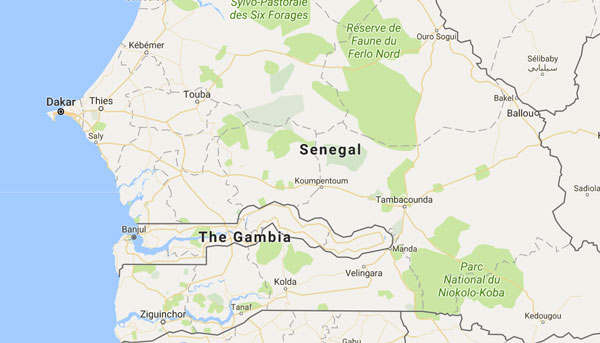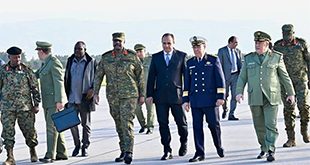
Banjul, Gambia | AFP | After being stripped, beaten, robbed, enslaved and finally deported back to The Gambia, Karamo Keita is clear: no young Gambian should go through what he did in Libya.
Keita and fellow migrants who suffered horrific abuses on their journey through the Sahara desert have formed a group to agitate for job creation from the new government and to dampen expectations among their peers that a life in Europe is within easy reach.
“We experienced the journey. We know the difficulties aspiring migrants face on the way and in Libya,” Keita, 27, told AFP, sitting under a tree at a recent meeting of Youths Against Illegal Migration near the capital Banjul.
So far this year, more than 5,400 Gambians have already made it to the shores of Italy from Libya, according to the International Organization for Migration (IOM), making Africa’s smallest mainland nation the highest per capita source of migrants making the perilous crossing.
Gambians have also made headlines for a string of tragedies on the final stretch of what is known locally as “The Back Way”, most notably 19-year-old goalkeeper Fatim Jawara of the women’s national soccer side, who drowned in October 2016.
President Adama Barrow, a onetime security guard in London, has said youth job creation is his top priority in a faltering economy.
“Youths are risking this journey to Europe. You cannot blame them. They get frustrated to a level they cannot do anything,” Barrow told AFP in an interview.
Youths Against Illegal Migration say however that top-level government officials have so far failed to respond to their initiative.
– Torture and slavery –
Despite a small drop in numbers on 2016, migration to Europe is the talk of every Gambian community, where everyone has a son, cousin or niece who left on a bus bound for Niger and on to Libya.
Keita and his fellow returnees believe many have an idealistic vision of what awaits them, often formed from social media images posted by Gambians who have made it across the Mediterranean.
Sketching the image of the harrowing journey he now shares as a warning to young Gambians, Keita recalls paying extortionate bribes in Burkina Faso and waiting for a smuggler in Agadez, Niger, bound for Libya, where his real nightmare began.
“In Libya, black people have no right, and they have no say,” Keita said, describing days spent labouring for free for racketeers with hopes of reaching the war-torn nation’s northern coast, always in fear of kidnappers or police.
“We were taken to various farms where the Libyan guy sold us as ‘slaves’. We worked on the farms for free,” Keita said.
“We worked continuously. Some of us were gun-butted by the Libyans for working slowly,” he added.
“All we could do was to pray to escape alive.”
The worst was to come in January when mass police raids against illegal migrants were carried out in the capital Tripoli, which Keita had finally reached, and he was passed through a string of detention facilities.
“When I was arrested, they found money and a mobile phone on me. Everything was taken away from me. The soldiers stripped us naked and beat us until daybreak. It was raining and we were lying on the floor,” he recalls. “It was cold, too.”
He was far from alone. More than 6,000 Gambians are stranded in Libya, and the IOM said it has repatriated 787 Gambians from Libya so far this year.
Keita waited three months in a detention centre before the IOM asked if he would be voluntarily repatriated on a flight to Banjul.
Babucarr Jeng, 35, was with Keita in jail, not long before they left the country. “Before we returned home on April 4, we had a meeting and we decided to form an organisation to sensitise Gambians,” he told AFP.
REFUGEES: Why do people leave? #nowconf https://t.co/6wUSXTHZUy pic.twitter.com/v8UOu9CxuB
— The Independent (@UGIndependent) September 4, 2017
– Targeting rural areas –
Since returning, they said they have kept a promise made at the lowest point in their lives, and Youths Against Illegal Migration now has 164 members.
After press conferences, radio shows and weekly planning meetings, the next step is a national “sensitisation tour” targeting youths, their parents and relatives.
The Gambia’s rural areas, where income from farming and fishing is scarce and beach tourism is absent, are a steady source of income for the agents and smugglers who exploit people living in poverty.
These families somehow scrape together the thousands of dollars required for transport, bribes and accommodation along the route, which can take years if a Gambian becomes stranded in a Libyan jail or smuggler’s trap.
The group is very aware that the underlying cause is unemployment in a country where the young often support their families financially until they retire themselves.
To that end, Youths Against Illegal Migration plan to venture into farming and fishing in order to generate income for themselves, but they want the Barrow administration to help them with fishing boats and start-up cash.
“We want the government to allocate empty plots of land to us so that we can collaborate with the Ministry of Agriculture,” Keita told AFP, adding the profits would be ploughed back into the group to expand its work.
A similar initiative could also work for fishermen, who lack equipment and support for work which is often seasonal, while fish stocks are plummeting.
For the price of a few boats, Keita believes, the government could “discourage a lot of fishermen from embarking on the risky journey to Italy.”
 The Independent Uganda: You get the Truth we Pay the Price
The Independent Uganda: You get the Truth we Pay the Price


